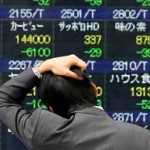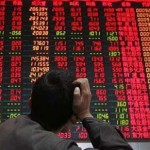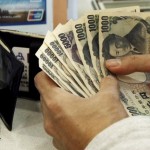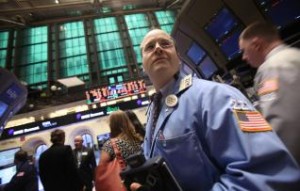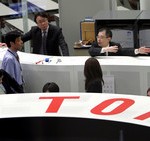
By Shiyin Chen and Shani Raja – Mar 16, 2011 4:20 AM ET
Global shares rallied for the first time in three days as the Nikkei 225 (NKY) Stock Average rebounded from a slump that sent valuations to a 28-month low and commodities gained. The dollar climbed versus the yen as fires at a Japanese nuclear plant hampered efforts to avert a meltdown.
The MSCI World Index added 0.8 percent as of 5:15 p.m. in Tokyo. The Nikkei 225 surged 5.7 percent, recovering from its biggest two-day drop since 1987, and the cost of insuring Japanese corporate and government debt from non-payment sank for the first time since the record earthquake on March 11. Copper and nickel jumped more than 2 percent and oil rose 1.3 percent. The dollar gained to 80.94 yen from 80.72 in New York yesterday. Futures on the Standard & Poor’s 500 Index increased 0.2 percent.
The rout in equities, which has wiped out more than $1.6 trillion of market value globally in the past two days, may be excessive as there is “little evidence” of any liquidity or solvency problems, according to Nomura Holdings Inc. The advance today was limited after further temblors struck Japan and as clouds of white smoke started rising from reactor buildings at the crippled Fukushima Dai-Ichi plant.
“Share prices had moved significantly out of kilter with fundamentals,” said Sydney-based Angus Gluskie, who manages about $350 million at White Funds Management Pty. “A growing percentage of investors are now taking advantage of the low prices to move into the market as buyers. This process will gain momentum if we see further evidence of a resolution of the nuclear-reactor issues.”
Japan’s Rebound
Almost four stocks gained for each that fell on the MSCI Asia Pacific Index, which jumped 3 percent, snapping a four-day loss. The Nikkei 225’s 16 percent tumble over two days drove the average price of shares on the gauge to 14.7 times estimated profits, the lowest level since November 2008. Toyota Motor Corp., which will restart production at seven parts plants in Japan from tomorrow, jumped 9.1 percent.
The effects on the Japanese economy of last week’s record magnitude earthquake and tsunami is likely to be temporary, and Japanese stocks may gain in the medium term, according to Goldman Sachs Group Inc. The Bank of Japan’s liquidity provisions could stop a strengthening yen, leading to a gain in share prices by the end of March, UBS AG said.
Radiation levels at the No. 4 reactor in Tokyo Electric Power Co.’s power plant hampered efforts to confirm the fire that broke out this morning had been extinguished, a day after a similar blaze at the same structure. A 5.7-magnitude aftershock hit 139 kilometers from Tokyo, while a 6.1-magnitude quake struck southwest of the capital last night.
Bond Risk
Five-year swaps on Japan’s sovereign debt declined 15 basis points to 105 basis points, according to Citigroup Inc. The contracts jumped to a record yesterday. The Markit iTraxx Japan index of corporate borrowers fell 22.5 basis points to 132.5 basis points, Citigroup prices show. That’s its biggest drop since May 26, according to data provider CMA in New York.
The yen traded at 113.02 per euro from 112.99, after earlier dropping 0.4 percent. The BOJ doubled its asset-purchase program to 10 trillion yen ($124 billion) on March 14, when it poured a record 15 trillion yen into the financial system in one-day operations. It added 8 trillion yen yesterday and pumped in 5 trillion yen today.
The euro slipped to $1.3962 from $1.3998. Portugal’s long- term debt rating was cut two steps to A3 from A1 by Moody’s Investors Service, which cited a “subdued” growth outlook, risks to implementing the government’s deficit-reduction plans, and a possible need to recapitalize its banks.
Metals, Oil
Copper rose 2.1 percent to $9,309 a metric ton on the London Metal Exchange on speculation that reconstruction needs in Japan will boost demand in three to six months. Zinc gained 1.8 percent, nickel jumped 2.5 percent and tin increased 1.4 percent.
Oil for April delivery rallied to $98.47 a barrel in New York after tumbling 4 percent yesterday, the most in almost five months, to settle at $97.18. Bahrain declared a state of emergency as a second contingent of troops from Gulf nations poured into the kingdom, while forces loyal to Libyan leader Muammar Qaddafi moved against rebels.
Bahrain’s stock exchange suspended trading today. The country’s five-year default swaps surged 44 basis points yesterday to 359.37, surpassing Lebanon for the first time since July 2009. Bahrain’s swaps have increased the second most in the world this year after Pakistan, prices by CMA in London show.
To contact the reporters on this story: Shiyin Chen in Singapore at schen37@bloomberg.net; Shani Raja in Sydney at sraja4@bloomberg.net.
To contact the editor responsible for this story: Nicolas Johnson at nicojohnson@bloomberg.net.
Other Stories
Stocks Rally After Three-Day Slide; Oil, Commodities Advance, Euro Weakens
British Pound Continues Gradual Ascent
Japan crisis puts world financial markets on edge
Buy, Sell or Hold
Currency Investing Where to Turn
Oil could reach $300 a Barrel
Gold prices will hit $2,500 in the near future
Global Investing Strategies
Profit From the One Company That Will Win the “Mobile Internet” Gold Rush
Different Investment Methods
Trade Spot Gold Online
Trade Oile Online
Trade Commodities Online
With Egypt in Turmoil, Oil and Food Prices Climb
Why you should Buy Rice Future
Shares rally as Mubarak resigns
Why you should Buy Rice Future
